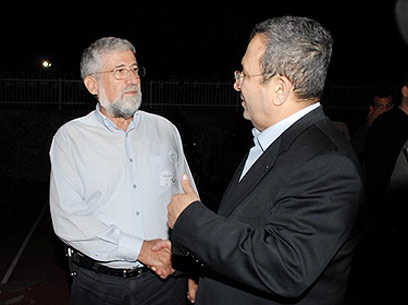
Former Prime Minister Ehud Barak said Thursday that last summer's war with Hizbullah was a failure, adding that Israel needed experienced leaders to guide it through times of crisis.
"When the dust settles over the conclusions of the Winograd Commission and the testimonies, one lesson will be drawn: In the state of Israel there no substitute to experience," he said in reference to the commission probing the war's handling.
Speaking in Haifa at a ceremony commemorating fallen soldiers, Barak added that despite the Israeli army's poor performance against Hizbullah, Israel remained the strongest country in the region – "from Libya to Iran."

Barak chats with former Labor leader Amram Mitzna (Photo: Doron Golan)
Barak is a leading contender in the race to replace Labor Party leader Amir Peretz in the May primaries.
Aides to Defense Minister Peretz harshly slammed Barak in response to the claim that the war was a failure.
"The man is simply shameless. The man who took the IDF out of Lebanon in a unilateral flight and without an agreement or an international force, and left Hizbullah to become stronger on the fence opposite Metula and opposite Shlomi, is the one responsible for the policy of turning a blind eye," a Peretz associate said.
The former prime minister added that the war left Israel in a leadership crisis and only an experienced leader could restore the country's confidence in its leaders and army.
Peretz: Barak's policy root of failures
Speaking to Ynet, an enraged Peretz fired back that, "Barak, with all the experience he has, has experience in fleeing too – like his escape from Lebanon (in the first war in Lebanon)."
"I didn't see his experience prevent him from employing a policy of turning a blind eye in Lebanon. This practice, which started in Ehud Barak's days, is what led to us wake up one day to the reality of an armed Hizbullah sitting on Israel's doorstep in tunnels they had been digging for years."
Peretz criticized Barak's unilateral policies. "There is no doubt that the unilateral diplomacy, which started in how we left Lebanon, is what led us to failure after failure. There is no relation between the decision to leave Lebanon, and the way we in which we retreated.
"The pictures burned into the public's memory, in Israel and in other countries in the region, are of the IDF leaving with no agreement, without passing the flag on to an official body who would take responsibility, and Hizbullah entered the resulting vacuum. We also cannot forget that Barak was responsible for breaking the moral code in his treatment of the Southern Lebanese Army members. Breaking moral codes - these are the seeds of calamity whose effect is recognized only later."
In closed conversations, Peretz declared that Barak has no right to contend for Labor's leadership. "He preferred to travel abroad while we fought over every vote, so has no right to come back and demand leadership of a party whose achievements he wasn't a part of. I think it's a basic rule of democracy, that someone who didn't vote Labor, and winked at other parties and chased off voters to other parties (cannot lead the party). I am certain that if we could bring in the fly on the wall that saw Barak vote – he would testify on a vote for Kadima."
'Olmert had good intentions'
Barak's speech underscored his eagerness to reenter politics six years after his dramatic loss to Ariel Sharon in the 2001 general elections.
"(Former IDF Chief of Staff) Dan Halutz is one of the most talented people we have; Amir Peretz is a talented person and so is (Prime Minister Ehud) Olmert. They had good intentions and what happened to them proves that even among the highest ranks more experience is required," Barak said.
The three leaders are largely expected to be reprimanded by the government-appointed commission over their handling of last summer's conflict.
The High Court ruled Thursday that the Winograd Commission must release the testimonies of Halutz, Peretz and Olmert two weeks after it published its interim report at the end of April.
"In the Middle East the weak get no favors, and those who don't know how to defend themselves will not get a second chance. Accords are achieved only from a position of strength and confidence, and out of recognition by our enemies that they cannot defeat us," Barak said.
Attila Somfalvi contributed to the report















